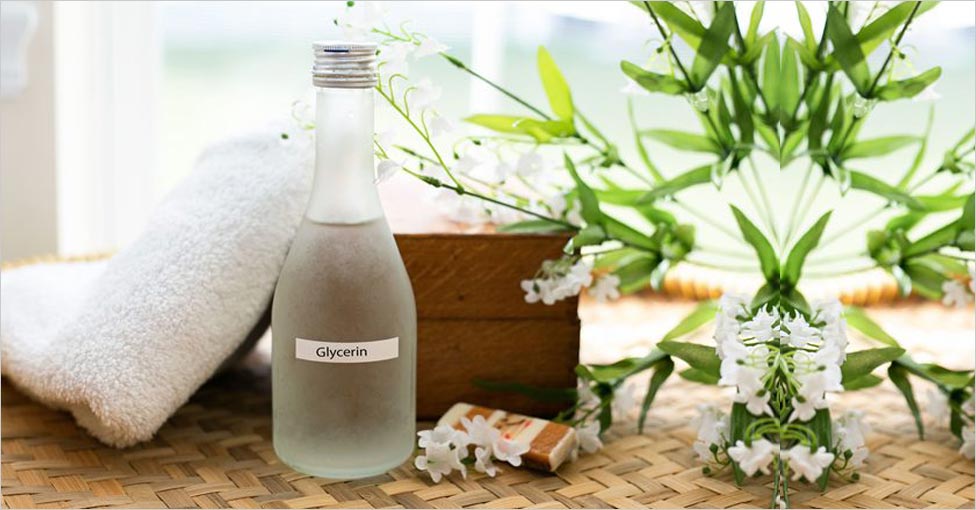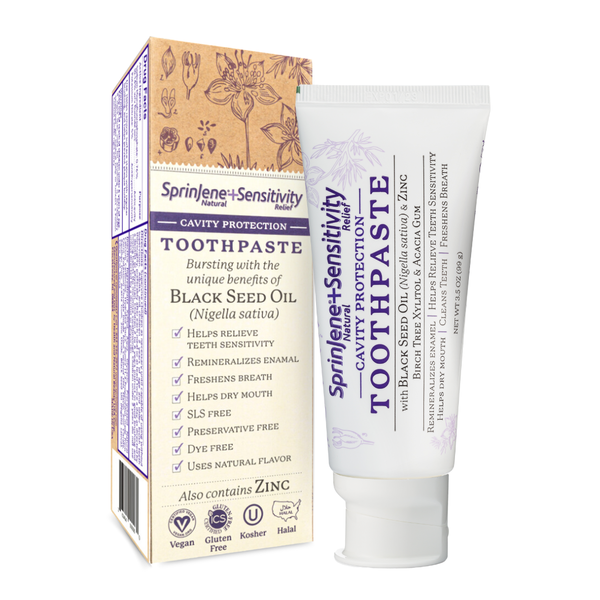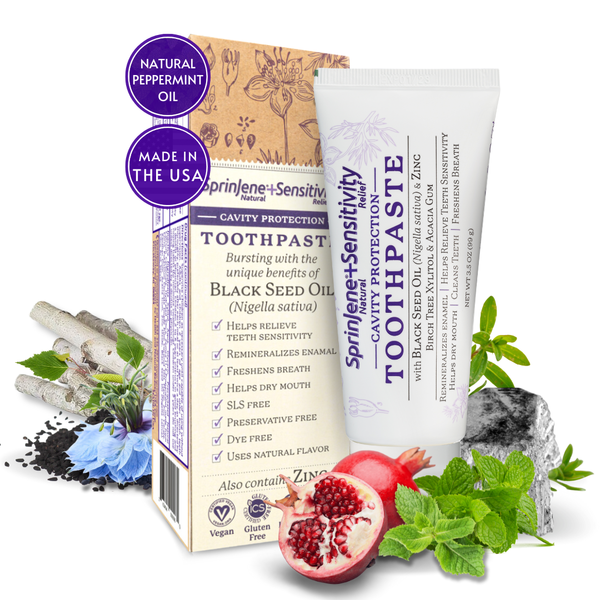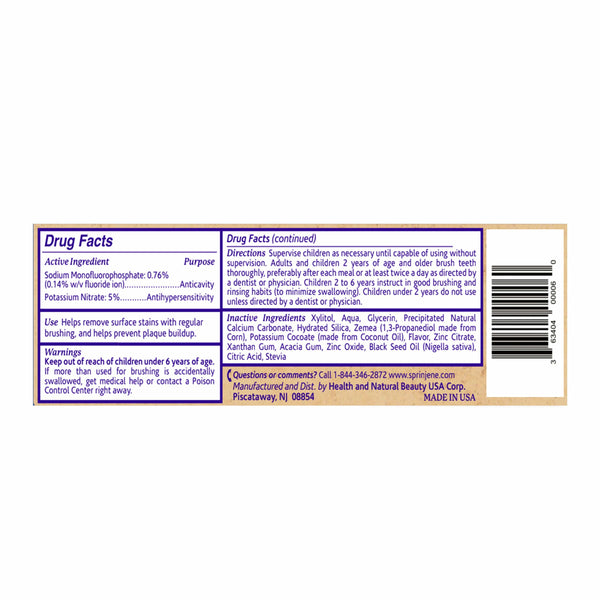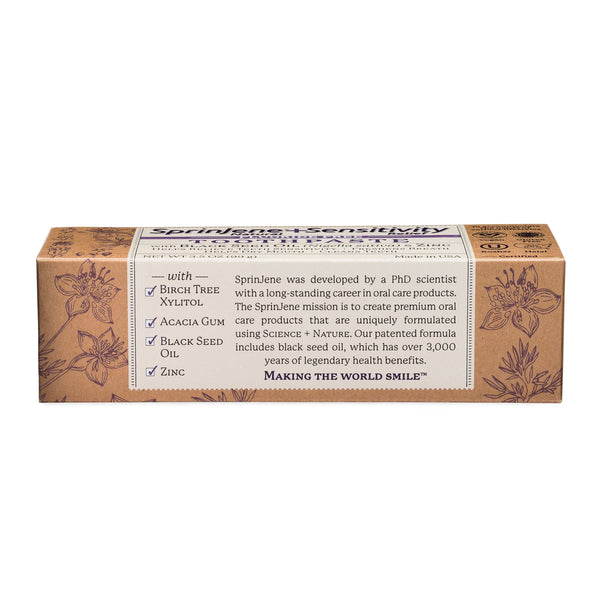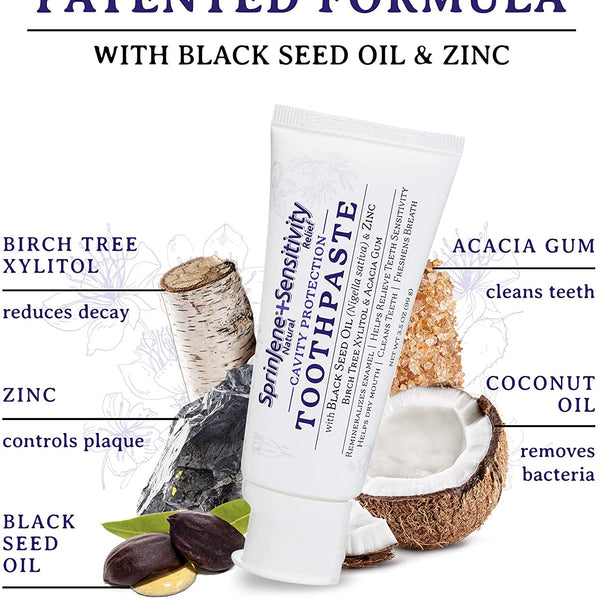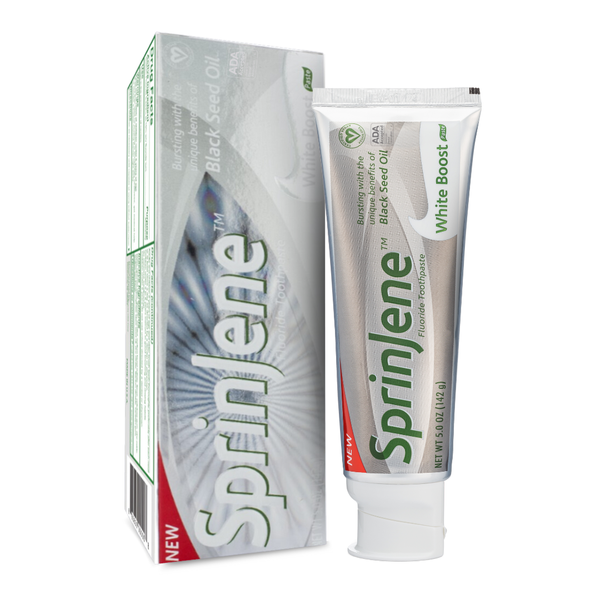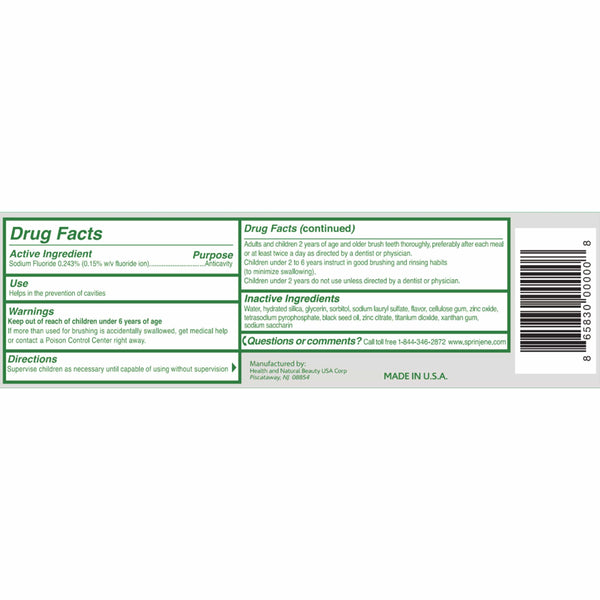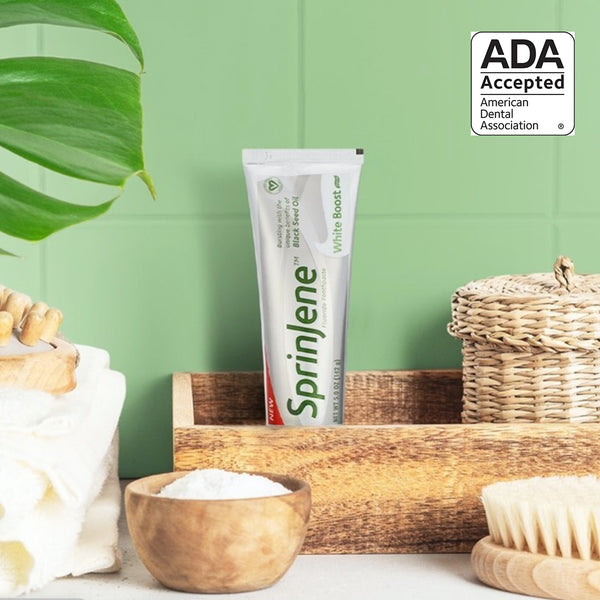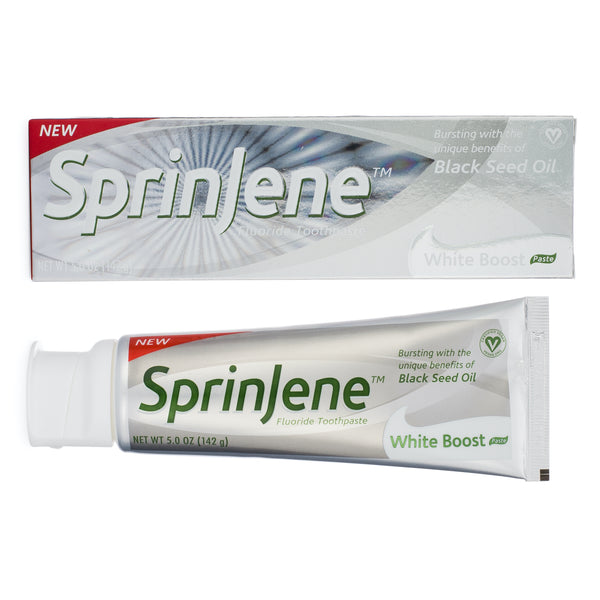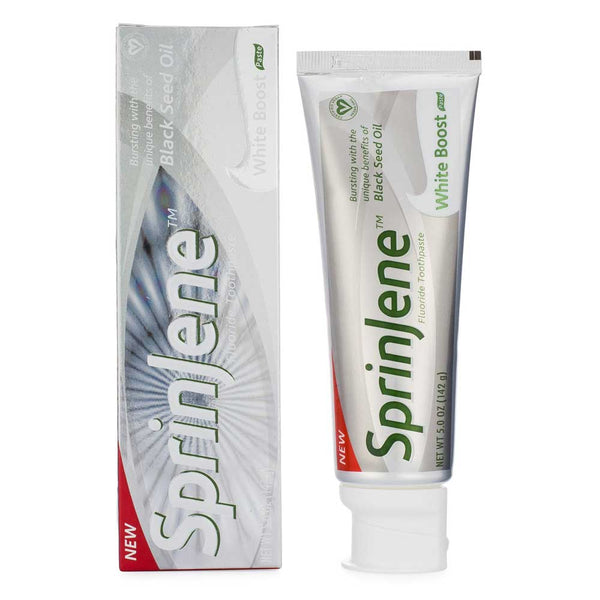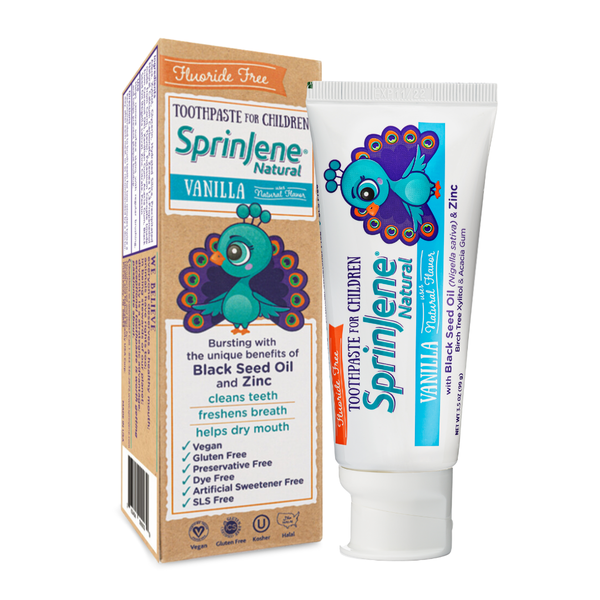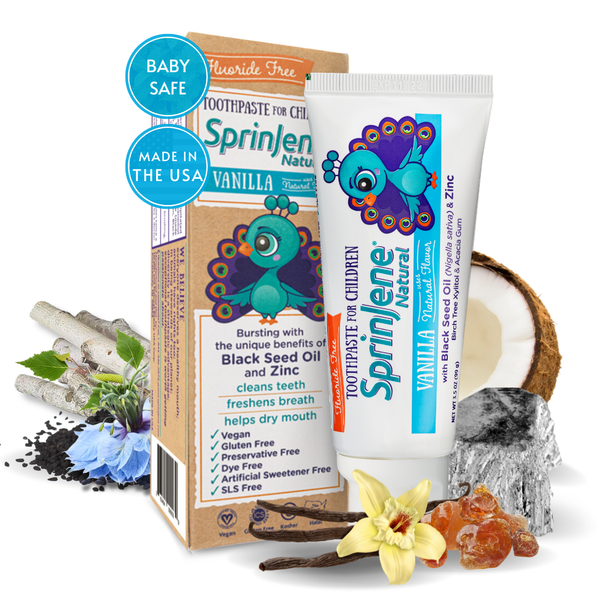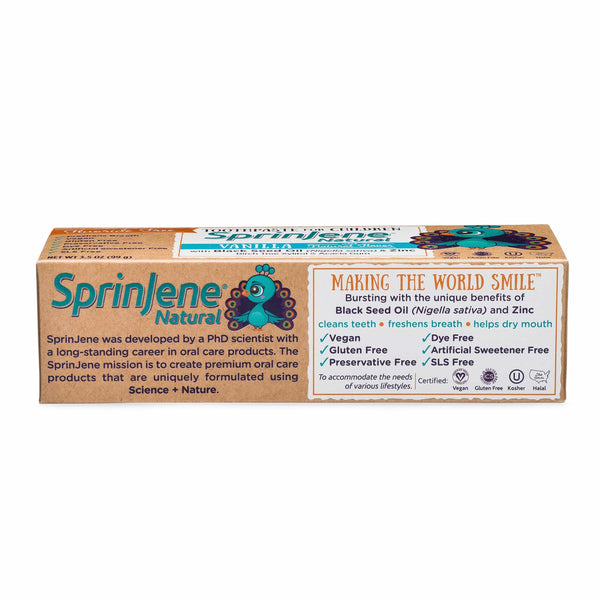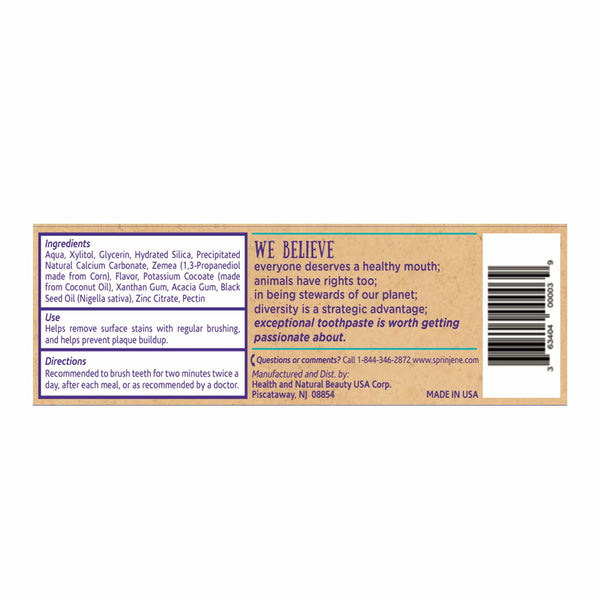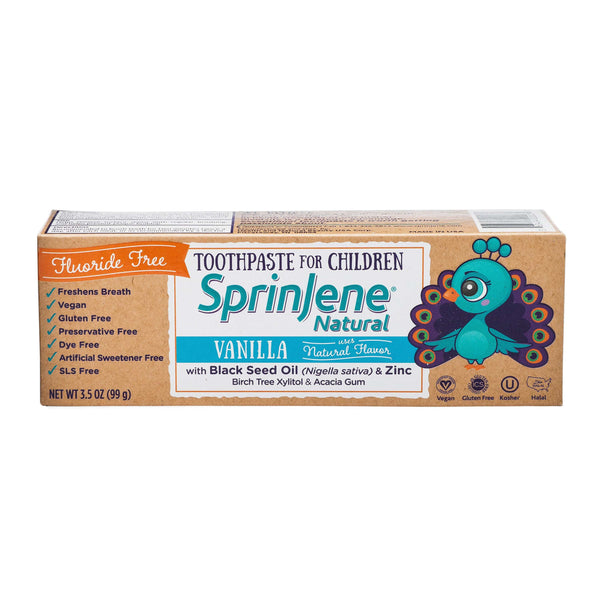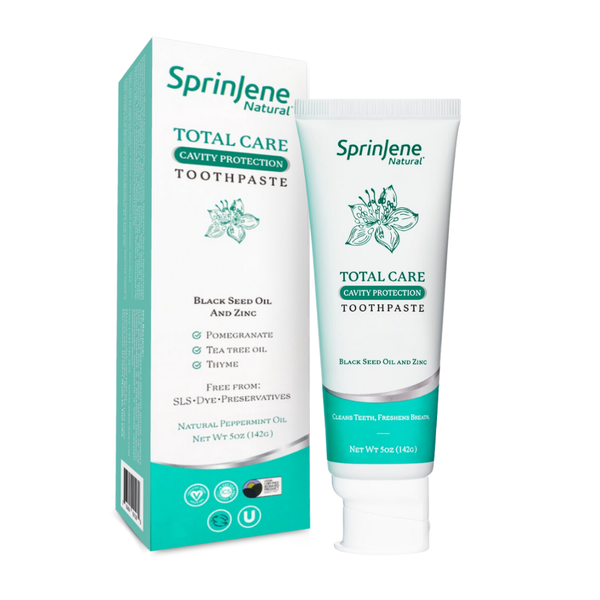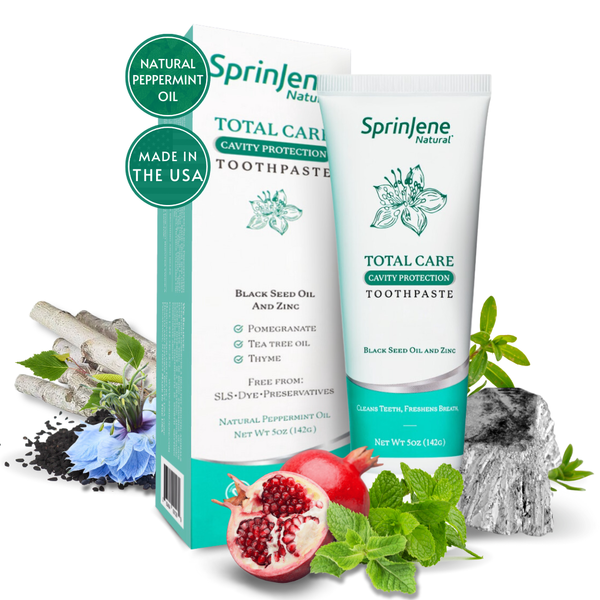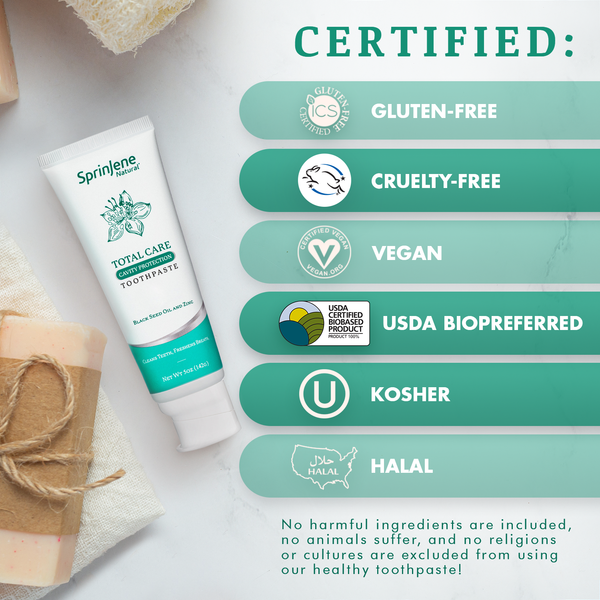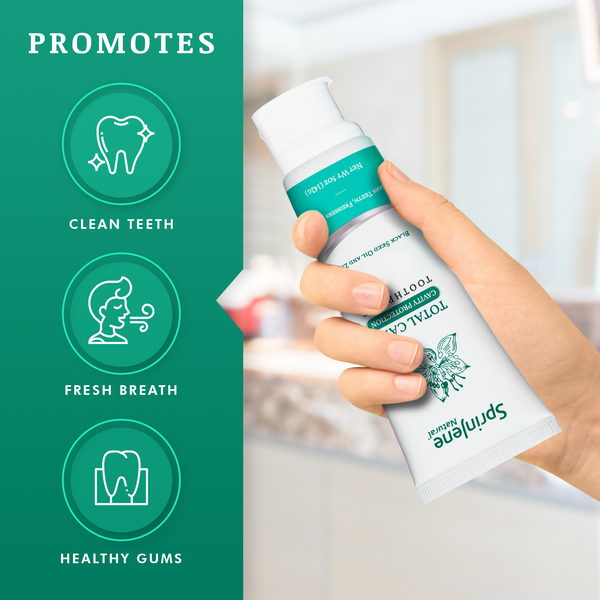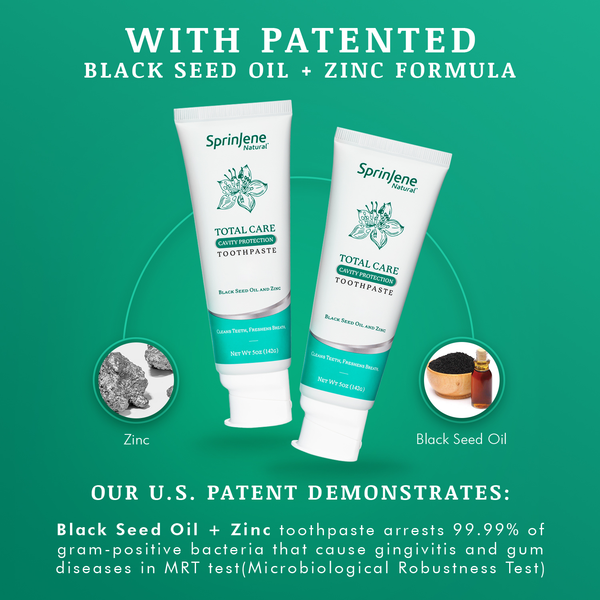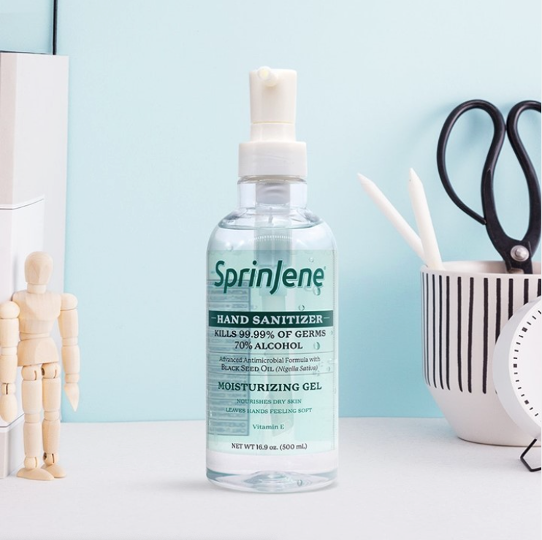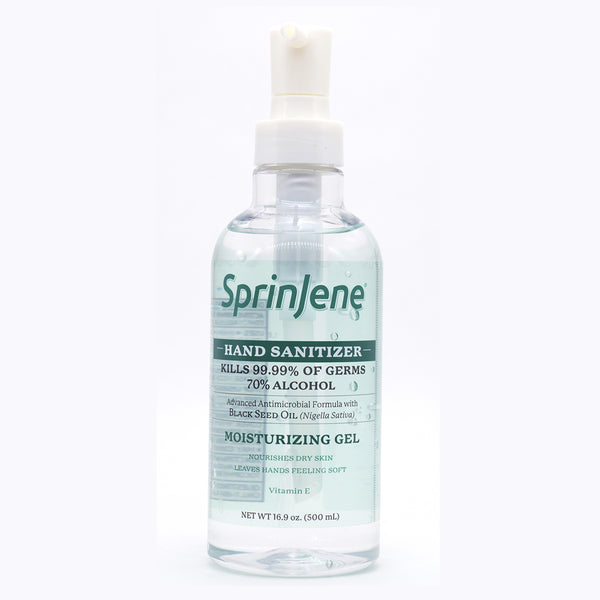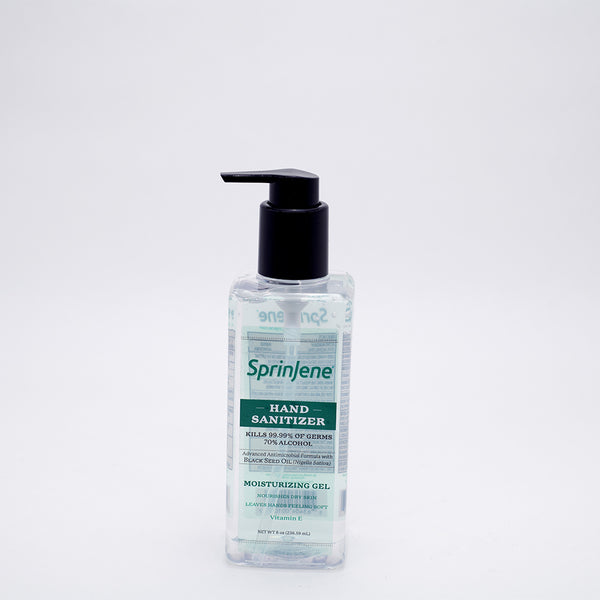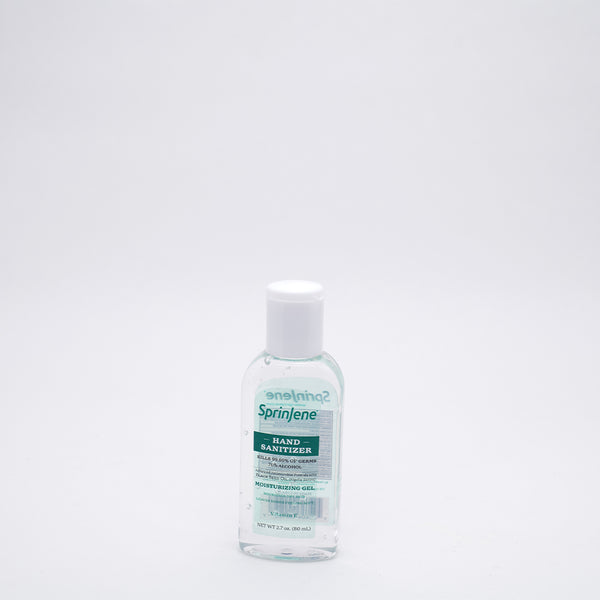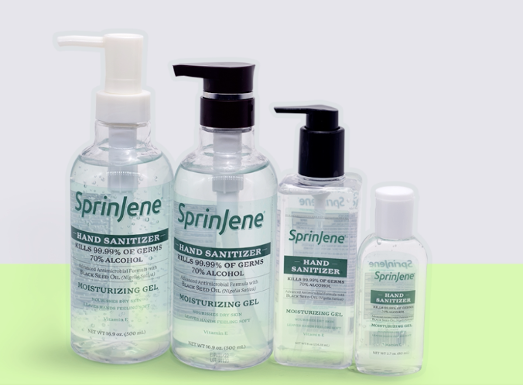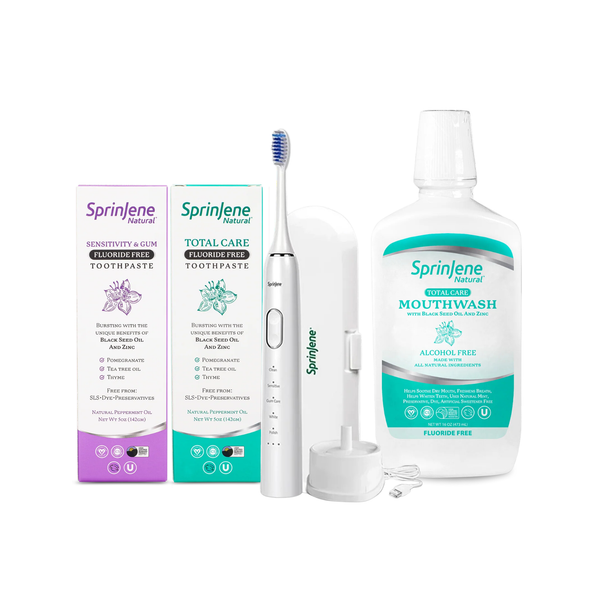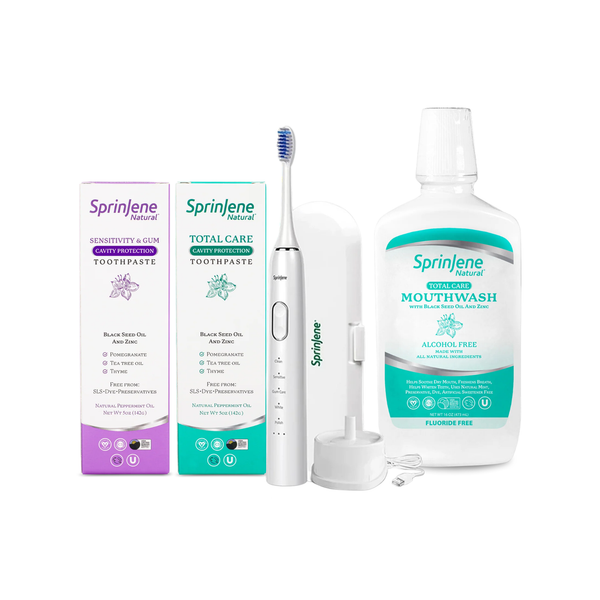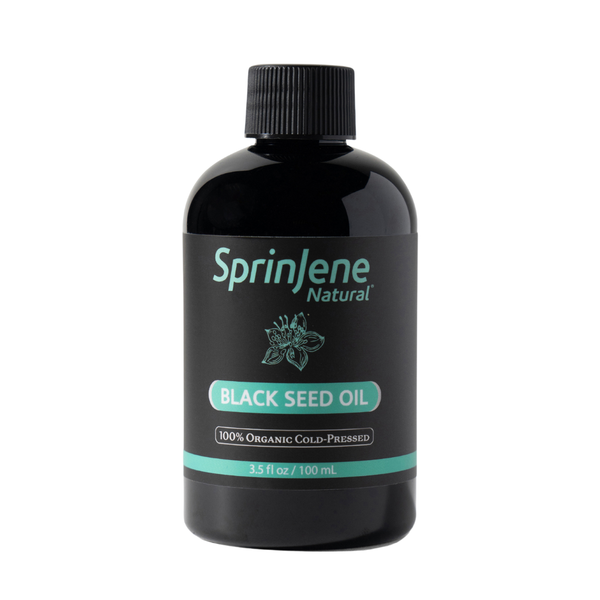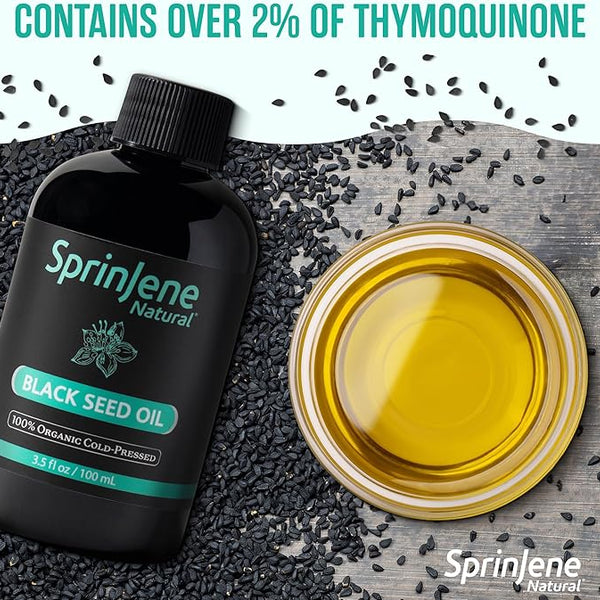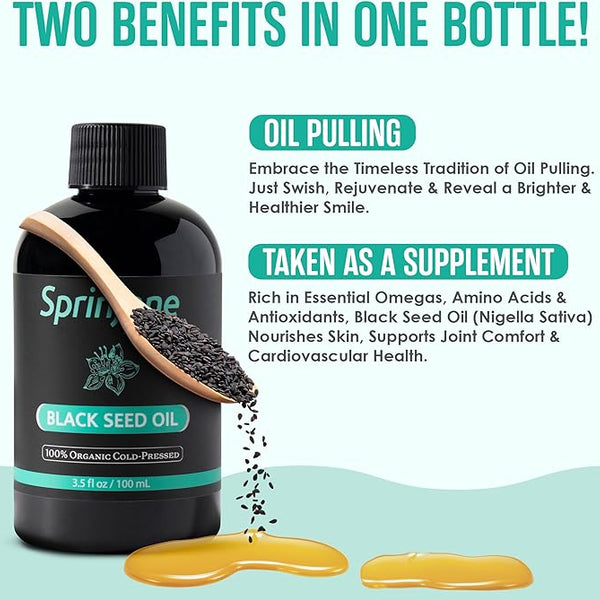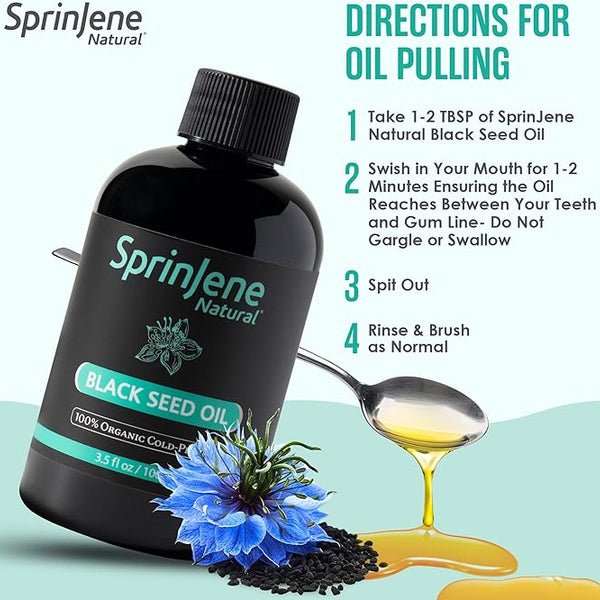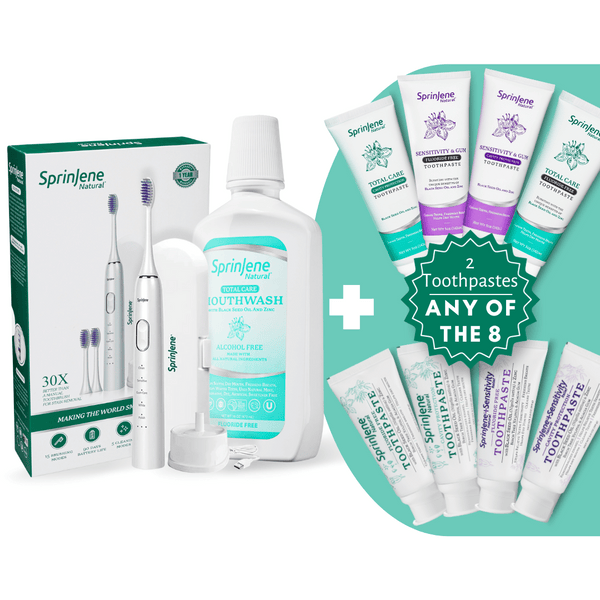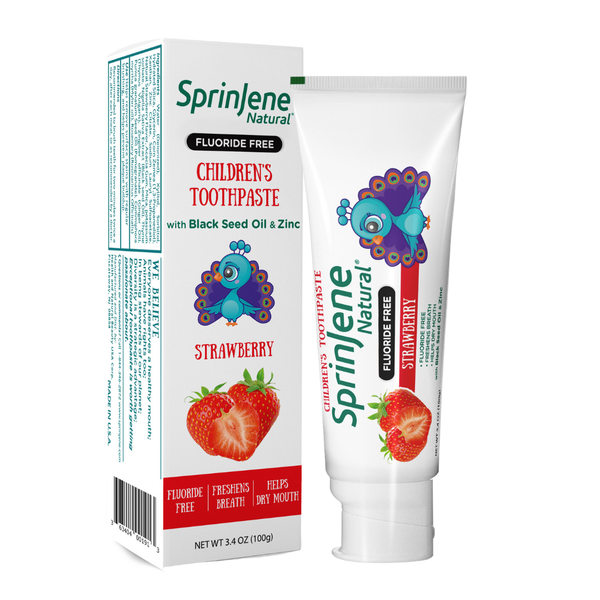
SUMMARY: Is there pork, glycerin or animal fat in my toothpaste?
Toothpaste is a product used to clean teeth and freshen breath, it is made up of several ingredients.
Some toothpastes use glycerin which is derived from animal fats, mainly pork. This is used to give the toothpaste its texture.
Some commercial toothpastes also contain harmful ingredients such as sodium lauryl sulfate, flavorings, artificial sweeteners, dyes and colorings, antimicrobials and thickening agents.
There are alternative options such as Sprinjene toothpaste which is 100% pork-free and made with pure vegetable-derived glycerin and free of harmful ingredients, making it suitable for people with religious or cultural beliefs that prohibit the consumption of pork.
Choose SPRINJENE toothpaste for a cleaner, healthier mouth without compromising your beliefs. Made with pure vegetable-derived glycerin and free of harmful ingredients and pork, it's a perfect alternative for those who want to avoid pork-based toothpaste. Order now.
Toothpaste is an aid in daily personal hygiene. It is used with a tooth brush, which together help to keep the oral cavity is kept clean, free of bacteria and fresh smelling. Brushing after each meal or at least twice a day is recommended to maintain a healthy mouth and general overall health. However, often we may overlook the ingredients in the toothpaste products we use. Some of which may go against personal, religions or cultural beliefs. So let's break down what types of ingredients can be found in toothpaste, their use, and alternative options to help you avoid consuming products that contain anything that may go against your beliefs.
Pork and its uses in dental products:
Since it is cheaper to derive glycerin from the fat taken out of animal bones such as pork, it has been used in several toothpaste brands to give tooth paste its texture. Historically pig hair was also used to make tooth brush bristles. Today pork is used for its fat to obtain glycerin which is used in many household products in the modern world.
Glycerin can come from various animals. The most common sources being tallow which is a kind of beef or mutton fat. Pork is also used to make over 40 products including toothpaste. The fat that is extracted from its bones is incorporated in making many types of toothpastes to give it texture.
However glycerin can also be obtained from vegetable and plant sources. The most common being soya bean and palm. It is made by heating triglyceride-rich vegetable fats such as palm, soy and coconut oils under pressure or together with a strong alkali, such as lye. This causes the glycerin to split away from the fatty acids and mix together with water, forming an odorless, sweet-tasting, syrup-like liquid.
Pigs also make a very significant contribution to the world of industrial and consumer products. Pig co-products are sources of chemicals used in the manufacture of a wide range of products that cannot be duplicated by syntheses. Additionally, pig skin is used extensively as high-quality leather for clothing, shoes, and handbags, sporting goods, upholstery and more. Along with toothpaste there are many other house hold products that come from the pig. These include insulin for the treatment of diabetes, valves for human heart surgery , suede used in shoes and clothing, and gelatin for foods and non-food uses.
Swine by-products are also important components in making water filters, insulation, rubber, antifreeze, certain plastics, floor waxes, crayons, chalk, adhesives and fertilizer (USDA, 2016). Lard is defined as fat from pig abdomens and is used in shaving creams, soaps, make-up, baked goods and other foods.
Commercial toothpastes and their ingredients:
While there are many well-known brands in the market that obtain glycerin from animal fat especially pork, Sprinjene uses pure vegetable obtained glycerin and is 100% Halal and Kosher.
Other harmful ingredients that are present in commercial toothpastes which are not present in any of SprinJene products are:
Choose SPRINJENE toothpaste for a pork-free alternative that still provides cavity protection and fresh breath."
-
Sodium Lauryl Sulfate
- The most common ingredient in toothpaste is sodium lauryl sulfate (SLS) or lauryl sarcosinate, which helps create a foaming lather in the mouth and removes dirt and grease from the teeth.
-
Flavorings
- The taste of toothpastes is due to the strong flavoring agents and the sweeteners which mask the taste of other ingredients and enhance palatability of toothpaste.
- Aspartame is the most common artificial sweetener used, which is 200 times sweeter than sugar.
-
Dyes And Colorings
-
Blue, red, yellow and green are the popular dyes used in the toothpaste.
-
-
Antimicrobials
-
Antimicrobials in toothpaste retard oral bacterial growth. Triclosan, an antibacterial agent to fight gingivitis, is found in toothpaste.
-
-
Thickening Agents
-
Carrageenan, cellulose gum, guar gum, xanthan gum, and gluten are used to thicken the toothpaste.
- Humectants, such as glycerol, propylene, glycol, and sorbitol, all prevent water loss from toothpaste and help to keep it moist. Xylitol is also used for this purpose, which provides moisture and prevents cavities. It is more effective than fluoride in preventing dental caries in children's permanent teeth. It has not been found to cause any harmful effect.
-
-
Preservatives
- Sodium benzoate, methylparaben, and ethylparaben are the common preservatives used in toothpaste.
-
Diethanolamine
- (DEA) is found in foaming toothpastes.
Get a cleaner, healthier mouth with SPRINJENE toothpaste. Made with pure vegetable-derived glycerin, free of pork and harmful ingredients. Order now.
SPRINJENE NATURAL TOOTHPASTE
This is a brand of toothpastes which is exceptionally reliable and can cater to all of your dental needs. One that is made entirely from Natural ingredients and is free from harmful chemicals. It can be used by adults and children alike.
SprinJene toothpastes take pride in its patented black seed and zinc formulation which makes it unique and different from all other toothpastes. This 100% Natural toothpaste is made up of a fabulous mix of ingredients which have immense benefits including being:
- Anti-bacterial
- Anti-plaque
- Anti-fungal
- Anti-inflammatory
- As well as having wound healing properties.
All of these properties along with being chemical free, pork free, cruelty free and 100 percent safe and natural makes SprinJene toothpaste an ideal choice for you and your family.
Here is a list of the natural ingredients present in SprinJene Natural tooth paste along with their medical benefits:
- Black cumin seed (Nigella sativa): The chemical compound thymoquinone isolated from N. sativa seed oil blocks pancreatic cancer cell growth in vitro and kills the cells by enhancing the process of programmed cell death (apoptosis) acting as an HDAC inhibitor.
- Coconut oil: Helps lubricate oral surfaces to bring comfort to dry mouth sufferers and may help to prevent tooth decay after some enzyme digestion
- Zinc: Helps control the growth of bacteria, plaque and tartar thereby promoting healthy gums. ADA Approved
- Glycerin: Glycerin is a non-carcinogenic and a Non-GMO humectant that helps protect our formulas against bacteria growth and keep the product moist.
- Silica: Natural abrasives to assist stain removal
- Acacia gum : A natural organic binder.
- Xylitol and Stevia: They are both safe and natural non-cariogenic sweeteners. Stevia may help control blood sugar and Insulin levels. It may also help in lowering blood pressure. Xylitol helps promote saliva production and prevents tooth decay. It is also ADA approved.
In addition to these properties SprinJene is a certified Gluten free toothpaste making it 100% safe for people suffering from Celiac disease and gluten allergies. Also certified Halal, cruelty free and kosher.
References:
Winfield A.J, Richards R.M.E. Pharmaceutical practice. Churchil Livingstone, Edunburgh, London, New York, Philadelphia, San Francisco, Sydney, Toronto: 1998. pp. 421–423. [Google Scholar]
(2) Mitsui T. New cosmetic science. Elsevier, Amsterdam, Lausanne, New York, Oxford, Shannon, Tokyio: 1997. pp. 480–490. [Google Scholar]
(3) Sweetman S.C, editor. Martindale: The complete drug reference. 33rd Edition. London: Pharmaceutical Press; 2002. [Google Scholar]
(4) Bruneton J. Pharmacognosy, phytochemistry, medicinal plants. Paris: Intercept Ltd; 1999. pp. 45–52. 53-57. [Google Scholar]
(5) Matshuhiro B, Urzua C.C. Heterogeneity of carrageenans from Chondrus crispus. Phytochemistry. 1992;31:531–534. [PubMed] [Google Scholar]
(6) European Pharmacopoeia. 4th Edition. Strasbourg: Council of Europe; 2002. [Google Scholar]
(7) Becker A, Katzen F, Püshler A, Ielpi L. Xanthan gum biosynthesis and application: A biochemical/genetic perspective. Appi. Microbiol. Biotechnol. 1998;50:145–152. [PubMed] [Google Scholar]

